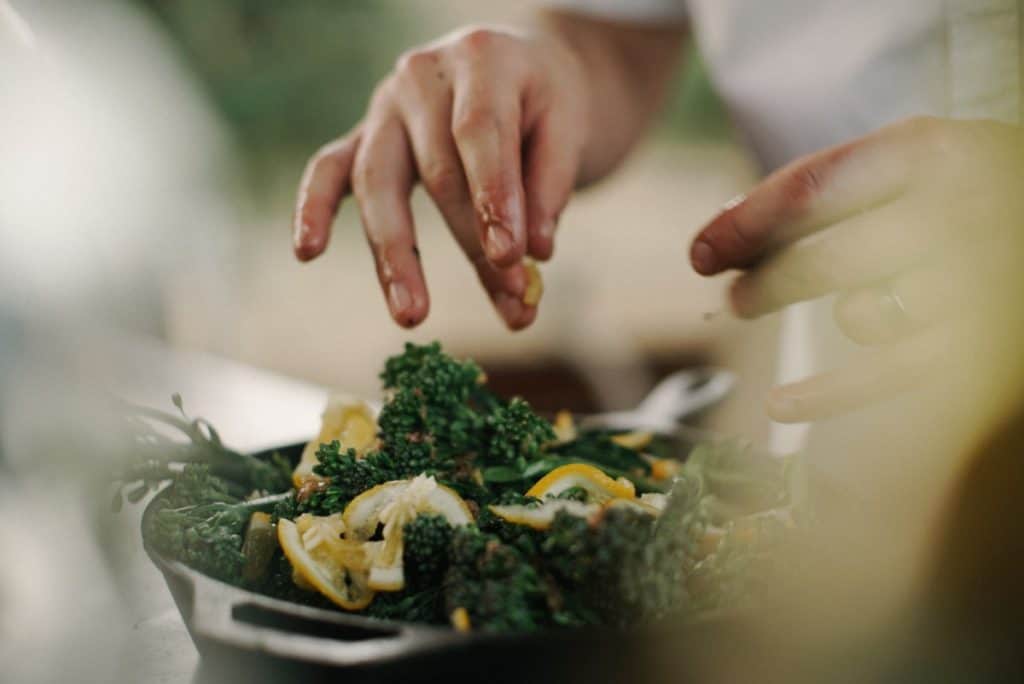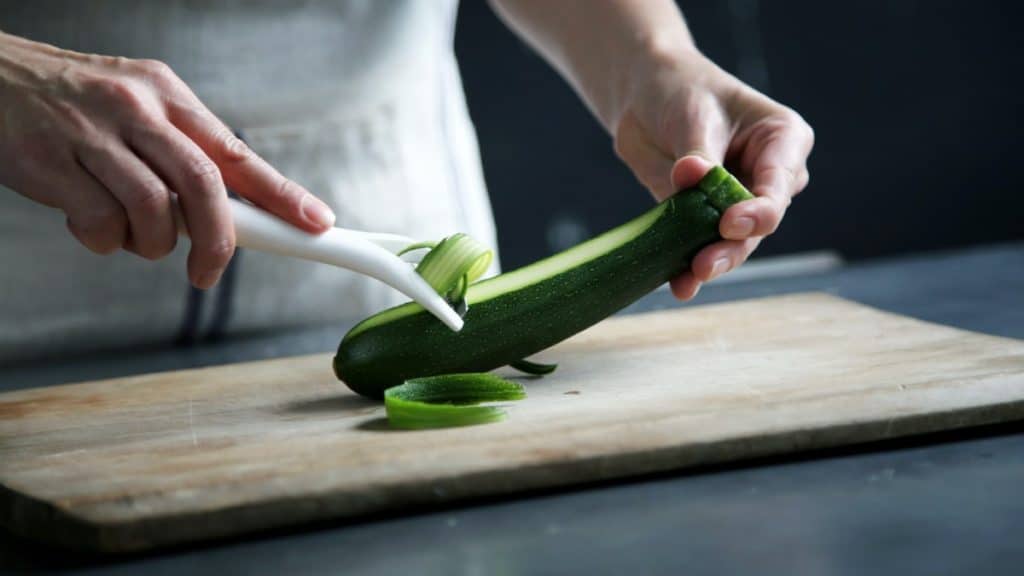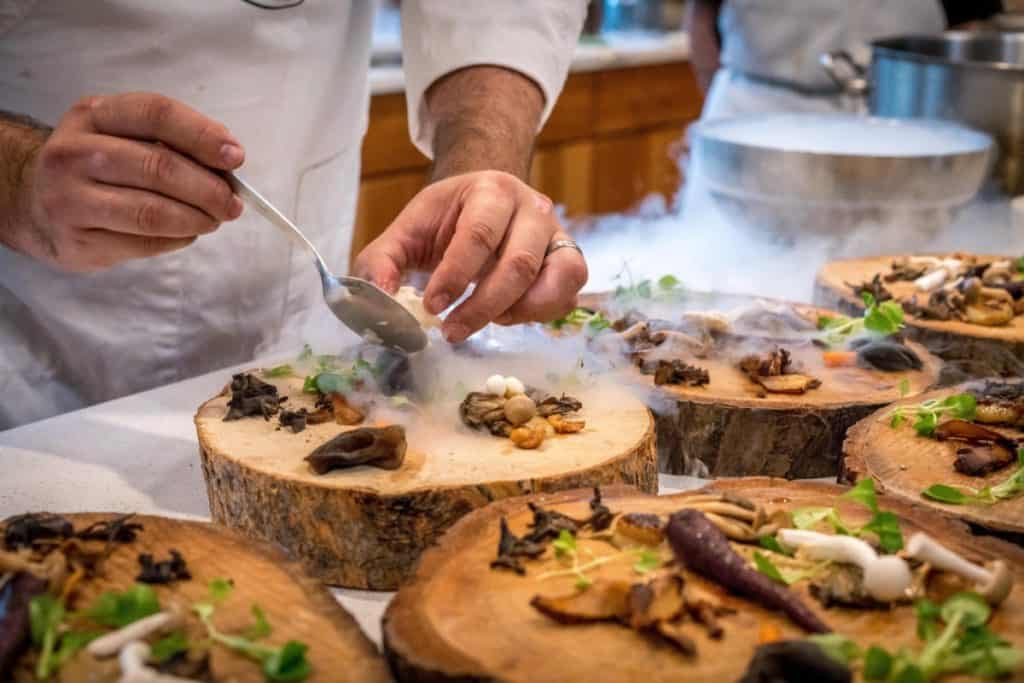
Is being a commis chef hard? This is a question that plays on many aspiring chefs minds.
We have all seen the images of a screaming and shouting chef and new chefs want to know if they are likely to find themselves on the receiving end of a verbal lashing.
Commis chef is the position which all new chefs will have to start out at, it is effectively the lowest ranked chef position within a kitchen. Being the lowest rank in any environment can be challenging, especially in the world of professional catering.
is the position which all new chefs will have to start out at, it is effectively the lowest ranked chef position within a kitchen. Being the lowest rank in any environment can be challenging, especially in the world of professional catering.
In my experience, being a commis chef is hard. You have so much to learn in such a short amount of time and the culture shock of working full time in a kitchen can be a little overwhelming. That being said, I also found plenty of highs to balance out the lows.
Some newcomers are fearful that in this position they will be expected to do lots of unglamorous work and deal with verbal abuse on a daily basis. Is this a fair concern to have?
This article is based on my experience as a commis chef within a large hotel kitchen. By sharing a few of my ups and downs I hope that it will help newcomers decide if being a chef is hard work.
I worked as a commis chef for several years whilst completing my cookery NVQ qualification alongside working full time.
alongside working full time.
I feel like pretending it is super easy would be pointless. Anyone entering a kitchen needs to be prepared to work hard and deal with the less glamorous side of catering. However, in reality it really isn’t bad and anyone with the right attitude to work will excel!
of catering. However, in reality it really isn’t bad and anyone with the right attitude to work will excel!
How Long Did I Have To Work As A Commis Chef?
The answer really is dependent upon where you work and the standard of cuisine being produced.
I worked as a commis chef in a 2 rosette hotel and was in this position for about two years. I did have some catering experience coming from a chain pub environment but all my skills in terms of cooking from scratch had to be learnt in the new commis chef role.
hotel and was in this position for about two years. I did have some catering experience coming from a chain pub environment but all my skills in terms of cooking from scratch had to be learnt in the new commis chef role.
Two years is a good indication of the time frame we can expect to spend as a commis chef before progressing up the career ladder. In this amount of time we can work our way around the various kitchen sections learning all the basic skills we require.
This time frame also allows us to complete an NVQ in professional cookery which is important as we progress our career.
After two years, once qualified, I was promoted to the position of chef de partie . Fortunately for me, as the kitchen had a relatively high number of staff and the associated high turnover, a position became available relatively quickly.
. Fortunately for me, as the kitchen had a relatively high number of staff and the associated high turnover, a position became available relatively quickly.
This isn’t always the case, particularly in smaller kitchens. If the needs of the kitchen are that you stay at commis level, or a chef de partie position simply isn’t available, then it can mean having to change work location in order to get promoted.
level, or a chef de partie position simply isn’t available, then it can mean having to change work location in order to get promoted.
Some chefs choose to stay at commis level for many years whilst they keep working in higher and higher standard kitchens to gain as much experience as possible.
For example, after a couple of years a 1 Michelin star commis chef may move to a 2 Michelin star commis position. Still a commis chef but a definite career progression!
commis position. Still a commis chef but a definite career progression!
Are Commis Chef Jobs Difficult?

The type of tasks vary on the size of the kitchen, but I will give an overview of how my two years where broken down to give readers an idea of what the role is like on a daily basis.
It’s worth remembering that smaller kitchens have more of an everyone pitch in together attitude. Larger kitchens are able to have more clearly defined sections and roles.
On my first day as a commis chef I was placed on the veg section to work alongside another 2 commis chefs and a chef de partie. I was quickly given a box of veg to start peeling and prepping!
Most new commis chefs will start on the veg section. I spent about six months on this section working hard (if is say so myself) and learning the basics.
Each day I would go into work where my chef de partie would be waiting. He would give me my tasks for that day (the chef de partie runs the section and hands out the tasks)
A typical day would see me prepping potatoes, peeling and preparing vegetables and learning the absolute basics, such as how to make a risotto base, or how to make a lasagna for the kids menu (7 stages of a chefs typical day ).
).
When readers think of the veg section its important to remember that they are responsible for many elements of the dish.
The veg section I worked on produced the accompanying elements of the dishes, such as roast potatoes, parsnip puree and that kind of thing. We where also tasked with dealing with any kids menu orders that came in, alongside any sandwich or bar food orders.
I worked on produced the accompanying elements of the dishes, such as roast potatoes, parsnip puree and that kind of thing. We where also tasked with dealing with any kids menu orders that came in, alongside any sandwich or bar food orders.
Sandwiches, kids meals and bar food are all the simple sort of dishes that are great for new chefs to learn on; and dishes that the more established chefs are happy not to get distracted with.
It can be hard to be a commis chef, when you are busily working away on something you enjoy (perhaps making dauphinoise potatoes for the first time) and you get pulled away to make a sandwich or Child’s pizza.
However frustrating it can be at the time, my advice is to try and remember that this is temporary and we have all been there.
Every chef would like to begin their careers on the meat section cooking fillet steaks and being a vital member of the team. The reality is that these are high level positions that take time to reach. We have to put the work in at ground level.
that take time to reach. We have to put the work in at ground level.
Is Training To Be A Commis Chef Hard?
Whilst training to be a chef, I found the hardest part was the pace of learning required. A lot of information is thrown at you in a very short space of time. You are expect to retain this information and produce dishes to a high standard almost instantly.

I always found paying close attention to the directions being given helped massively with this, as well as jotting down new dishes into a recipe book. No matter how easy the dish, it is never too early to start making notes around how to make things!
In terms of the actual learning to cook I always found it enjoyable , so although it is a challenge I’m not sure I would use the word difficult to describe it.
, so although it is a challenge I’m not sure I would use the word difficult to describe it.
However, learning to cook during service time is absolutely difficult!
Getting accustomed to remembering what orders you have on, dealing with timings and communicating with other sections are all skills that take an enormous amount of work!
The service times will absolutely be challenging to beginner chefs – they are challenging enough at times to the most experienced chefs!
The two main pieces of advice I can give for coping with busy services when you start and throughout your career are.
- Number 1: Stay Calm. Learn this skill early on as it will hold you in good stead throughout your career. Getting worked up and trying to rush only causes mistakes and makes matter worse. The best chefs get calmer the more the pressure comes on, as they know that’s the ideal way to deal with it.
I have worked with some excellent chefs who produce fantastic dishes when service is quiet. Unfortunately, they panic and turn into a reck when the pressure starts coming on. This is a real problem and a trait that needs to be avoided at all cost!
Part of staying calm is also not getting angry or shouting.
The head chef or sous chef
or sous chef may get angry and shout. Even the chef de partie
may get angry and shout. Even the chef de partie may raise his voice at times. As a commis we need to maintain our cool and respectfulness, it really does help us to build a good reputation as a solid and dependable member of the team.
may raise his voice at times. As a commis we need to maintain our cool and respectfulness, it really does help us to build a good reputation as a solid and dependable member of the team.
- Number 2: Learn the systems necessary to make busy times easy. I have spoke in previous articles about the systems chefs use (which I will link here
 ).
).
By relying on cooking and hygiene systems such as the correct colour chopping boards , no matter how busy it gets, the system performs – so that we can be consistent and catch any mistakes before they happen.
, no matter how busy it gets, the system performs – so that we can be consistent and catch any mistakes before they happen.
I personally always found the service time a real buzz. When service is going well this is the point when the camaraderie is high and the banter among the chefs is great.
That is not to say being a chef is easy! As a commis chef I had many times I would come home from work really despondent and fed up because I had a bad service.
Overtime I learnt that this is all part of the learning process. I began to realise that good and bad services are all part of the job. The trick is to learn and progress so that we have more good services than bad ones!
As commis chefs we are likely to find the job hard and have more nights where we struggle than nights we feel good.
This is perfectly normal and all part of learning. Digging in and soldiering through it really helps build confidence. Remember that even the greatest chefs have been through this.
When service is going badly, the shouting can start . I feel some potential new chefs have this idea that kitchens are full of angry swearing and shouting chefs, but is that a fair representation?
. I feel some potential new chefs have this idea that kitchens are full of angry swearing and shouting chefs, but is that a fair representation?
Is It Hard Getting Shouted At As A Commis Chef?

I can personally count on one hand the number of times I was actually shouted at as a commis chef. This number may be higher or lower for others dependent upon the kitchen and the head chef. In my experience kitchens are friendly places.
The image of a head chef screaming and shouting all day long is not a reality!
screaming and shouting all day long is not a reality!
This is really important for new chefs to realise. Yes, there are times when you may get shouted at. Shouting is the language of the kitchen at some moments. There have been times as a chef de partie or sous chef when I have been shouted at by a senior as well.
The point is that this is isolated and part of the job. I quickly learned not to take it personally. As I progressed I dished out a few of my own verbal bashings. It’s part of the structure of maintaining discipline and trying to steer the ship through service in exceptional times.
I would liken it to a school teacher shouting at the class. If they did it all the time it would simply loose effect and the class would zone out. It’s always the nice teachers who rarely shout that can snap the class to attention when they raise their voice!
Sometimes it can be justified whilst other times it is unfair. As a commis, we are so new and learning so much that other chef’s expectations of us can outweigh our experience and ability.
I remember one incident where after being a commis chef  for about 1 month, I was asked during a really busy service to make a hollandaise sauce. The problem was I had never made one before!
for about 1 month, I was asked during a really busy service to make a hollandaise sauce. The problem was I had never made one before!
Sure enough I made a right mess of it and split the sauce (as is easy to do I may add!) The Sous chef screamed at me that he needed the sauce.

This was my first proper taste of being shouted at in a kitchen and I learned two important things.
- It really isn’t that bad, although upsetting its not a personal attack, it is a chef who is highly stressed because he is getting harassed for orders from the front of house.
- My chef de partie swooped in and made a new hollandaise for me. He knew I couldn’t make the sauce and was there to back me up. This showed me that the team atmosphere in kitchens is really strong.
My chef de partie chatted to me afterwards and told me not to worry about it, and the sous chef (although he didn’t apologise) made a point of chatting to me about something generic afterwards.
chatted to me afterwards and told me not to worry about it, and the sous chef (although he didn’t apologise) made a point of chatting to me about something generic afterwards.
This is another important point. Chefs are quick to fire and quick to forget. No one holds grudges and everyone moves on fast.
As a commis, although I experienced some shouting I never experienced any bullying. In fact quite the opposite, most chefs I encountered where really friendly and happy to show and teach their skills.
and happy to show and teach their skills.
Bullying is unacceptable in kitchens and is stamped out immediately. If it isn’t then look for another job quickly. there are so many great kitchens there is no need to put up with any mistreatment.
We’ve covered some of the main topics around why being a commis chef is hard but the final factor we should mention is the hours that have to be worked.
Is It Hard As A Commis Chef To Work Long Hours?

The kitchen teams I have been a part of, the commis chefs tend to do slightly less hours than everyone else.
As a commis chef I would typically work around a 50 hour week. This was slightly less than some of the more senior members of the kitchen at the time. However, alongside this full time work I also had to complete my NVQ in professional cookery in my spare time.
Going from a school or college environment to working as a full time chef can be a huge shock. All of a sudden we are expected to be on our feet for 50 hours a week and the physical demands can be very difficult to cope with at first.
and the physical demands can be very difficult to cope with at first.
I was fortunate that I had been a cook in a chain pub before taking my commis chef position so my body was already use to the demands of kitchen life.
If you find yourself struggling, do not fear. Our bodies soon adapt to the high work load and physical excursion required. When starting it can be exhausting and you wonder how you are going to cope, but pretty quickly we adapt and it becomes far more manageable.
required. When starting it can be exhausting and you wonder how you are going to cope, but pretty quickly we adapt and it becomes far more manageable.
Long hours are unfortunately the norm within the catering industry. Although it gets easier to manage they still take a toll on our bodies over time. New chefs joining should be aware of these physical demands.
Readers may have noticed a pattern when it comes to the hard parts of being a commis chef.
To Sum Up
What starts of very difficult becomes easier as we learn and adapt.
My experience of being a commis chef taught me that the first 6 months are tough! There is so much to learn, everything is so new and the physical toll of the long working hours are a real grind at first.
However, once I was through this initial period, I had some solid skills and knowledge under my belt and really began to feel like an integral part of the team.
The more a part of the team I felt the more more my confidence grew. The remaining 18 months of my commis chef time got easier and easier. There were still lots of tough days and difficult moments, but by overcoming them my confidence kept growing and growing.
Being a commis chef is hard. This is what makes it a rewarding and challenging career. This hard initial period is a barrier to entry that some people are not willing to go through.
By going through the rigour of a professional high pressure kitchen we earn respect from our peers (How chefs earn respect ). It is the difficult and challenging time as a commis chef that we have to go though that helps create the great atmosphere and camaraderie among the brigade.
). It is the difficult and challenging time as a commis chef that we have to go though that helps create the great atmosphere and camaraderie among the brigade.
Gordon Ramsay is so respected because he has been there and done it, serving time cooking under the famously difficult chef Marco Pierre White . Our difficult commis chef experiences almost become a badge of honour.
. Our difficult commis chef experiences almost become a badge of honour.
Every chef that is a professional and serious about their career will have been through this commis chef initiation at some point. Through the challenging times they will have learnt skills, gained confidence and importantly respect for others along the way.
